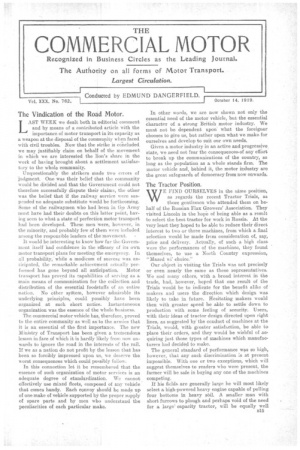The Vindication of the Road Motor.
Page 1

If you've noticed an error in this article please click here to report it so we can fix it.
LAST WEEK we dealt both in editorial comment and by means of a contributed article with the . importance of motor transport in its capacity as a weapon at the disposal of the commupity when faced with civil troubles. Now that the strike is concluded we may justifiably claim on behalf of the movement in which we are interested the lion's share in the work of having brought about a settlement satisfactory to the whole community.
Unquestionably the strikers made two errors of judgment. One was their belief that the community would be divided and that the Government could, not therefore successfully dispute their claims, the other was the belief that if the railway service were sus-. pended no adequate substitute would be forthcoming. Some of the railwaymen who had been. in, tke Army must have had their doubts on this latter point, having seen to what a state of perfection motor transport had been developed. These, men were, however, in the minority, and probably few of them were included among the responsible leaders of the movement.
It would be interesting to know how far the Governm,e,nt itself had confidence in the efficacy of its own motor transp.ort plans for meeting the emergency. In all probability, while a modicum of succese was anticipated, the remarkable achievement actually per formed has gone beyond all anticipation. Motor transport has proved its capabilities of serving as a main means of communication for the collection and distribution of the essential foodstuffs of an entire nation. No other synem, however admirable its underlying principles, could possibly have been organized at such short notice. Instantaneous organization was the essence of the whole business.
The commercial motor vehicle has, therefore, proved to the entire community as well as to the armies that it is an essential of the first importance. The new Ministry of Transport has been given a tremendous lesson in face of which it is hardly likely from now onwards to ignore the road in the interests of the rail. If we as a nation do not profit by the lesson that has been so forcibly impressed upon us, we deserve the worst .consequences which could possibly follow.
In this connection let it be remembered that the essence of such organization of motor services is an adequate degree of standardization. We cannot . effectively use mixed fleets, composed of any vehicle that comes handy. Each convoy should be made up of one make of vehicle supported by the proper supply of spare parts a-nd by men who, understand the peculiarities of each particular make. In other words, we are now shown not only the essential need of the motor vehicle, but the essential character of a strong British motor industry. We must not be dependent upon' what the foreigner chooses to give us, but rather upon what we make for ourselves and develop to suit our own needs.
Given a motor industry in an active and progressive. state, we need not fear the consequences', of any effort to break up the communications of the country, so long as the population as a whole stands firm. The motor vehicle and, behind it, the motor industry are the great safeguards of democracy from now onwards.
























